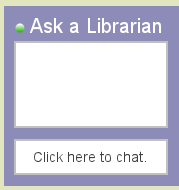Information Update - Fall 2004
From the Library Dean
- The Weinberg Library will be working on three new initiatives during the coming year. The Directory of Open Access Journals is a service that provides access to quality controlled Open Access Journals. Open access journals are defined as journals that use a funding model that does not charge readers or their institutions for access. The objective of the Directory is to increase the visibility and ease of use of open access scientific and scholarly journals thereby promoting their increased usage and impact. It aims to cover all subjects and languages. There are now 1135 journals in the directory, of which currently 295 journals are searchable on article level. Please visit the web site at http://www.doaj.org/
- American Library Association defines information literacy as a set of abilities requiring individuals to "recognize when information is needed and have the ability to locate, evaluate, and use, and communicate effectively the needed information." The Middle States Commission on Higher Education (MSCHE), one of six regional associations that accredit public and private institutions in the United States, now lists development of information literacy competencies among its standards. Middle States' definition of information literacy is based upon Information Literacy Competency Standards for Higher Education developed by the Association of College and Research Libraries in 2000.
- The Weinberg Library Faculty will work with faculty to incorporate information literacy into their teaching, to develop course-embedded student learning outcomes for information literacy, and to design assignments that encourage responsible, intelligent, and expansive use of digital information resources.
- Another initiative for discussion and planning this year is the development of a University institutional repository for the management and dissemination of digital materials created by our institution. Clifford Lynch, Executive Director of the Coalition for Networked Information defines a university-based institutional repository as "a set of services that a university offers to the members of its community for the management and dissemination of digital materials created by the institution and its community members. It is most essentially an organizational commitment to the stewardship of these digital materials, including long-term preservation where appropriate, as well as organization and access or distribution. While operational responsibility for these services may reasonably be situated in different organizational units at different universities, an effective institutional repository of necessity represents collaboration among librarians, information technologists, archives and records mangers, faculty, and university administrators and policymakers."
- Content may include electronic publications, pre-prints, working papers, technical reports, conference papers, editorials of a scholarly nature, other scholarly works-in-progress, peer-reviewed articles, monographs, course ware, enduring teaching materials, multimedia objects, ancillary research material, conference papers, electronic theses, university publications, university governance materials, committee minutes, and more.
- I look forward to working with you during the coming year.
Charles E. Kratz
Library Dean
Library Dean

